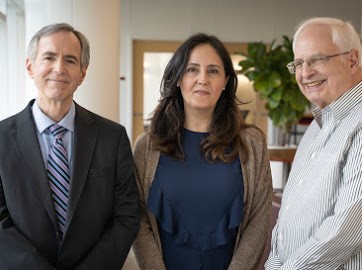World Health Organization Collaborating Center for Research Evidence for Sexual and Reproductive Health: Our View
Overcoming implementation challenges: the role of implementation science
The global health community is struggling with the challenge of implementing policies, programs, and practices successfully, sustainably, and at scale. Further, many of our most promising life-saving and life-enhancing innovations are not reaching the people they are intended to serve – especially those living in contexts in which availability and access to quality services are most challenging. Implementation science has much to offer on both fronts.

Dr. Peterson, Joumana Haidar and Dr. A. Blanton Godfrey (l-r)
In 2005, Dean Fixsen, PhD, former professor of maternal and child health at the Gillings School, led a synthesis of the implementation research evidence to reveal an important “formula for success.” “Success” includes three interrelated factors — with all three required for improved outcomes.
First, one must begin with effective innovations — such as a new technical approach or new policy, program, or practice. Second, effective implementation of these interventions must take place. Even if an intervention is 100 percent effective in a randomized trial, if it cannot be implemented, no one benefits from it. Thus, innovation is not truly effective until it has been effectively implemented. Studies show that effective implementation requires competence, leadership and organizational support. Third, enabling contexts, including supportive organization and policy contexts, are needed for successful implementation.
We regard these three components — effective innovations, effective implementation, and enabling contexts — as inextricably linked, with all three required for successful and sustainable outcomes at scale. Implementation science is about making these three components interact with each other synergistically so that innovations will be more suitable for the contexts into which they are being implemented and contexts will be more ready and more supportive for successful implementation.
Our view is that the field of implementation science will contribute optimally to the achievement of global goals and objectives for women’s, children’s and adolescents’ health to the extent that it is linked closely with implementation practice. Specifically, as described in a commentary entitled, “Implementing Innovations in Global Women’s, Children’s, and Adolescents’ Health: Realizing the Potential for Implementation Science” published in the March 2018 issue of Obstetrics & Gynecology (PDF), we believe that a virtuous cycle should be created in which the needs of implementation practice drive the conduct of implementation research which, in turn, directly supports implementation practice.
